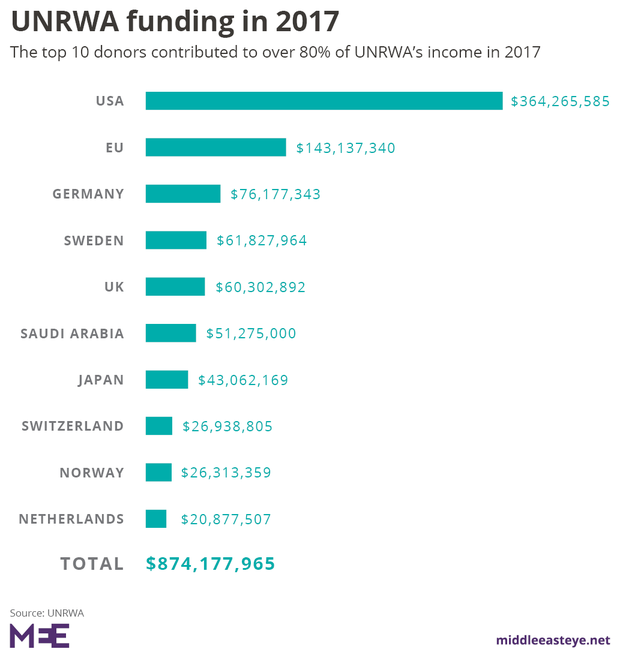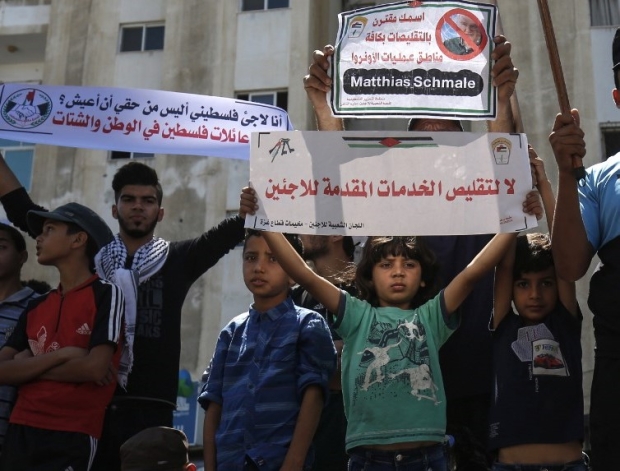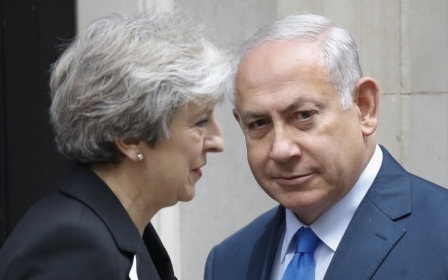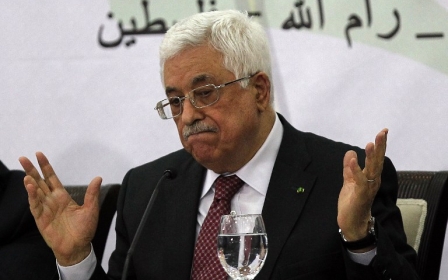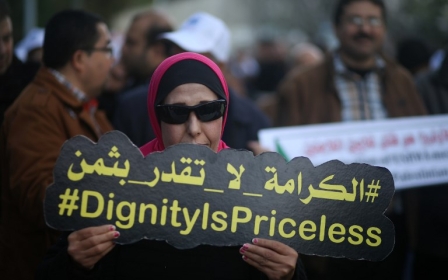Aid has been used as a tool to cripple the Palestinians - it's time we took back control
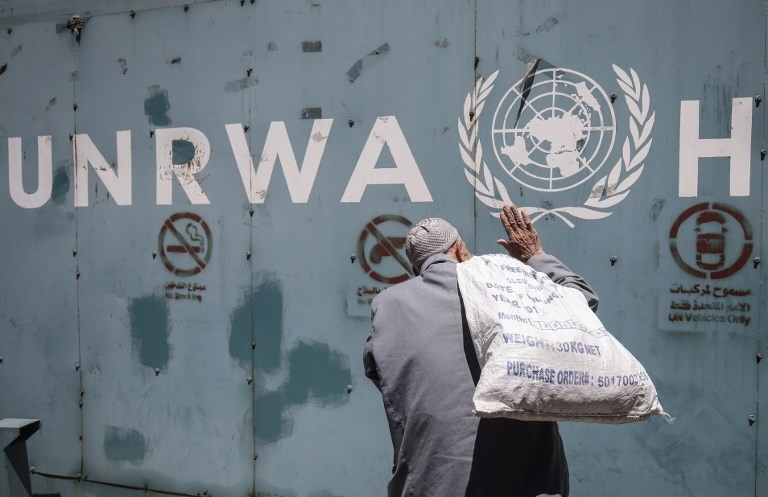
In 2006, following the victory of Hamas in the fair and democratic Palestinian parliamentary elections, key donors in the international aid industry halted their aid to the occupied West Bank and Gaza Strip to protest the outcome of the elections.
During that time, while I was working at a leading Palestinian university, we received letter after letter from donors informing us that our joint projects had been terminated, that collaboration had been suspended, and funding had been cut.
Ugly face of aid
We all panicked and felt saddened about the projects we were implementing; we felt humiliated to receive the news via fax - not even in a meeting or a call – that dictated our future. That experience showed us the ugly face of the aid industry, and illustrated to us what a bad idea it is to let others decide on our future.
It also showed us that aid is a twice-cursed "gift": it curses the giver and the receiver. But it also taught us a major lesson: if we Palestinians do not ensure dignity in our development, no one will.
This major lesson was not well understood or acknowledged by the Palestinian political leadership, and since then international aid continued to be wasted instead of being used effectively to transform people’s lives. The latest episode happened earlier this year when US President Donald Trump threatened to withdraw aid to the Palestinian Authority (PA).
He not only cut aid, but also moved the US embassy to Jerusalem, recognised Jerusalem as Israel’s capital, and attacked the UNRWA and the inalienable Palestinian right of return.
Apart from some fiery statements and glowing rhetoric, the Palestinian political leadership did not take any meaningful action to counter the US and its Trumpism
Apart from some fiery statements and glowing rhetoric, the Palestinian political leadership did not take any meaningful action to counter the US and its Trumpism. Last week, the US administration decided to slash more than $200m in Palestinian aid, yet the Palestinian political leadership's response continues to be strongly worded, but toothless, statements of condemnation, but without any action.
Here are four commonsense actions that the Palestinian political leadership could consider to respond to this recent cut in US aid.
Stop security coordination with Israel
First, halt all relations and cooperation with the US Security Coordinator (USSC). This would be in harmony with the PLO’s decision, the demands of all Palestinian political parties, as well as the Palestinian people, to stop Palestinian-Israeli security coordination and change the dynamics in the security domain.
Security coordination was a major reason why the USSC was created in the first place more than a decade ago. The USSC does not only violate key international principles of aid delivery because its intervention continues to cause harm to the recipient population, but it also acts as a complementary arm of the Israeli colonial occupation.The US aid is not aid for Palestine or the Palestinians; it is aid to sustain the brutal actions of their oppressor (the Israeli occupation), and it is also aid to the American contactors and their security personnel
The US aid delivered through the USSC intervention is not aid for Palestine or the Palestinians; it is aid to sustain the brutal actions of their oppressor (the Israeli occupation), and it is also aid to the American contactors and their security personnel.
In addition, the USSC intervention has not only aimed to protect the security of the oppressor, but it has also led to the additional repression of the oppressed people (the Palestinians) through making the Palestinian Authority security forces more authoritarian in nature, under the pretext of ensuring stability and law and order.
The harm caused by the US security mission (USSC) is evident and apparent, and it is time to hold it accountable and reject its intervention.
Harmful intervention
Second, shut down USAID projects and operations. The penetration of USAID in Palestinian society has been deep and harmful since its inception. The conditions they impose on the Palestinians, and the kind of intervention they pursue, not only leads to detrimental aid dependency and sustaining the damaging status quo, but it has also distorted the structure of Palestinian civil society, its set of values, and the underpinnings and foundations of the social contract between the governed and the governor.
To reverse these trends, it is time to stop USAID causing further damage. Its future intervention will be even more dangerous because it will be implementing the political vision of the US administration, which does not bode well for any kind of positive development, prosperity or peace.
It is time to stop business as usual for USAID and also to hold it accountable if the dignity of the Palestinian people is of concern. If it is not possible to tackle the historical damage it has caused, now there is a golden opportunity to prevent damage in the future, and an effective avenue for that to materialise is to shut down USAID projects and operations.
Commonsense goals
Third, cut ties with the US embassy in Jerusalem and its staff, support, projects, and personnel. It is not sensible to keep strengthening ties and welcome with open arms an entity that clearly and bluntly declares war on you, your people, and your fundamental rights.
To merely disregard the actions of the US embassy in Jerusalem, as the Palestinian political leadership opted for, is neither sufficient nor effective in changing the power dynamic.
Fourth, and finally, cut costs (by $200m) from the bloated bill of the Palestinian Authority security sector. As the big-ticket item in the PA budget continues to be its security sector, eating up around 30 percent of the budget and delivering very little security and protection to the Palestinian people, this recent decision of the Trump administration offers the Palestinian planners and political leadership an opportunity to reassess their priorities and move away from a paradigm that was forced on them to effectively serve as a subcontractor to the Israeli occupation.
Cutting $200m and sharing with the Palestinian people a breakdown and evidence of this cut will send a clear message to the US administration, and to the key players in the aid industry, that it is time to shift gears to ensure dignity, self-determination and local ownership in the delivery of aid to the Palestinians.
Certainly, these four proposed goals are political in nature, and they will have consequences for the current and future Palestinian political leadership and create some short-term pain.
But on the other hand, these goals are commonsense actions that many Palestinians might have been hoping for. I just wish commonsense was more common in Palestine, and beyond.
-Dr Alaa Tartir is programme adviser to Al-Shabaka, the Palestinian Policy Network, and a research associate at the Centre on Conflict, Development and Peacebuilding (CCDP) at the Graduate Institute of International and Development Studies (IHEID) in Geneva, Switzerland. Follow Alaa Tartir on Twitter @alaatartir and read his publications at www.alaatartir.com.
The views expressed in this article belong to the author and do not necessarily reflect the editorial policy of Middle East Eye.
Photo: A Palestinian man stands in front of the emblem of the UN Relief and Works Agency for Palestine Refugees in the Near East (UNRWA) outside the agency's offices in Gaza City on 31 July 2018 (AFP)
This article is available in French on Middle East Eye French edition.
New MEE newsletter: Jerusalem Dispatch
Sign up to get the latest insights and analysis on Israel-Palestine, alongside Turkey Unpacked and other MEE newsletters
Middle East Eye delivers independent and unrivalled coverage and analysis of the Middle East, North Africa and beyond. To learn more about republishing this content and the associated fees, please fill out this form. More about MEE can be found here.



